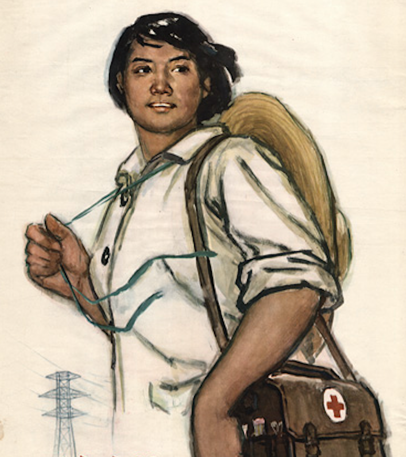Guest lecture: Barefoot Doctors on the move: Tracing a Concept and its Image Across Space
Mon, November 25, 2019, Guest lecture by Emily Graf, Phd, Freie Universität Berlin
Barefoot Doctors on the Move: Tracing a Concept and its Image Across Space

The term “barefoot doctor” (chijiao yisheng 赤脚医生) gained currency as a term and concept with Mao Zedong’s Directive in 1968, in which he insisted that medical work needed to be focused on the countryside. This involved great change for the health sector of the PRC that had previously been dominated by the strategies of the Health Ministry, which was run with the support of Soviet specialists, and which focused on fully-trained doctors in urban areas, aiming at developing higher expertise and specialization in their respective medical fields. With Mao’s Directive, doctors from urban medical establishments were increasingly “sent down” to the countryside to work in medical centers of the People’s Communes and train individuals in basic hygiene and primary medical care. Here they would offer classes for part-time health workers. The term barefoot implied that these newly-trained health workers would, ideally, also continue to work in the fields, which farmers did barefoot due to the flooded rice fields. Hence the term. By the early 70s, barefoot doctors added up to over one million and the basic health care coverage in rural areas increased drastically to finally cover up to 90%. The image of the barefoot doctor thus became key in visualizing the revolution of health care not only within the PRC during the Cultural Revolution, when it circulated in form of posters, but also globally. Images of the barefoot doctor as a symbol of support for and aid to Africa, for example, were key in creating a transcultural visual rhetoric of the Revolution. While in 1978 the “barefoot doctor” concept was viewed favorably by the World Health Organization (WHO), the term and practice would lose its recognition in the PRC after the Reform and Opening Period. This talk traces the history of the concept of rural health care in China and inquires how the image and concept of the barefoot doctor in particular moved beyond China. How did it travel? How was it received? And how did it shape how rural health care and community health workers are conceived in debates on Global Health today?
Emily Graf is a postdoctoral researcher at the Institute of Chinese Studies at the Freie Universität Berlin. She received her PhD in 2018 in Sinology and Transcultural Studies from Heidelberg University. Her primary research focuses on author museums dedicated to Lu Xun in the PRC, Bertolt Brecht in the GDR and Lai He in Taiwan. Taking a global perspective, she investigated how each author is represented as a left-wing writer and revealed how “world literary heritage” is thereby constructed through the display of their literary estates. A Visiting-PhD Fellowship at Renmin University of China, Beijing (2013-14) enabled her to visit author museums across China and Taiwan, interviewing museum directors, staff and visitors. She has taught classes on the writers Lu Xun and Lai He, on the contemporary writer Yan Lianke, as well as on past and present cultural politics in the PRC. In her recent research, she approaches the visual and cultural history of “barefoot doctors” and its relation to the field of Global Health.
Mon, November 25, 2019: 18:00-19:30, Erbprinzenstraße 12
Free entry - the lecture will be held in English
Hosted by: Institute of Chinese Studies at Freiburg University in cooperation with Confucius Institute Freiburg
